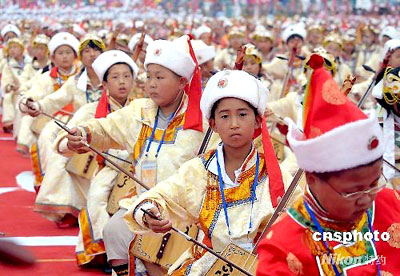SONGYUAN, Jilin: Thousands of local women took to the streets clad in traditional Manchu gege (princess) attire - 10-cm-long, healed "horse shoes"; mesh hair accessories; and high-collared cloaks with side slits - to greet the Olympic torch when it passed through Jilin province's Songyuan and Jilin cities on Tuesday.
 |
|
Local residents play matouqin, a Mongolian stringed instrument with a horse’s head carved at the end of the neck at the launching ceremony of the Songyuan leg of the Olympic torch relay in Jilin Province, July 15, 2008. [chinanews.com.cn]
|
Because both cities were cradles of the Manchu nationality, they highlighted local tradition in their relay celebration.
The relay started at 7 am in Songyuan, which gained municipal status in 1992.
Three rivers - the Songhua, the Nenjiang and the Lalin - run through the city, which has long been called "an oil city, a grain store, a meat store, a sea of trees and a place of fish".
Bordering the Inner Mongolia autonomous region and Liaoning province, Songyuan is also a major hub for ethnic Mongolians.
In addition to a grand dance performance by 1,000 Manchu gege, the city's relay ceremony featured a group performance by 2,008 Mongolian matouqin (a local two-stringed fiddle) players, aged from 10 to 65, setting a new Guinness World Record.
"The matouqin is a unique cultural symbol for us Mongolians," 46-year-old performer Narisu said. "We wish that such traditional culture would be passed down from generation to generation, just like the torch's flame is passed from one place to another."